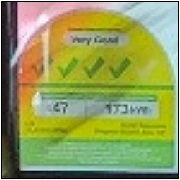|
That it may be but...aren't the only other 14nm chips in the mobile space? I mean thats not alot to go on...
|
|
|
|

|
| # ? Apr 20, 2024 05:10 |
|
Seamonster posted:That it may be but...aren't the only other 14nm chips in the mobile space? I mean thats not alot to go on...
|
|
|
|
Seamonster posted:That it may be but...aren't the only other 14nm chips in the mobile space? I mean thats not alot to go on... That's what I mean. So far Intel have been the only ones to try to create high power chips on the 14/16 node. The meh results don't bode well for the other players, since Samsung and tsmc will likely both be focused on the low power process corner. Hopefully tsmc's 16FF+ is decent for big chips, because GPUs have been stuck on 28nm for a long time
|
|
|
|
Man, I was hoping DDR4's memory bandwidth would make a bigger difference for fluid dynamics. I'd be better off with a G3258 beowulf cluster. I least there I get one memory channel per core. Bummer.
|
|
|
|
Palladium posted:I dunno why we are even bothering to overclock, man. The parts thread recommends a 4790K with a H97 board for this reason, to save a little cash vs Z97, but in reality get all the performance. The headroom on the newer Intel chips just isn't worth it.
|
|
|
|
Cardboard Box A posted:Their cores are bad though Linked page posted:Everything was run at stock and hyper-threading was disabled on the 4790K. I disable HT because I have a large library of older titles that I frequently play, and it can cause issues with them.
|
|
|
|
DuckConference posted:That's what I mean. So far Intel have been the only ones to try to create high power chips on the 14/16 node. The meh results don't bode well for the other players, since Samsung and tsmc will likely both be focused on the low power process corner. But they have done so much at 28nm its truly amazing.
|
|
|
|
Whats the point of TURBO if the CPUs throttle what they need to use anyway? Why not just say the Devil's Canyon i7 is "up to 4.4 GHz"
|
|
|
|
Prorat posted:Whats the point of TURBO if the CPUs throttle what they need to use anyway? Why not just say the Devil's Canyon i7 is "up to 4.4 GHz" The base clock is still important because the base clock can be sustained indefinitely with 100% iGPU usage.
|
|
|
|
Prorat posted:Whats the point of TURBO if the CPUs throttle what they need to use anyway? Why not just say the Devil's Canyon i7 is "up to 4.4 GHz" Isn't the Turbo frequency 1 or 2 cores only? [edit] Looking into Per Core Overclocking... My Core 0 is always 10c cooler than the rest. I wonder how much I could push a single 2500k Core? Ak Gara fucked around with this message at 21:43 on Aug 5, 2015 |
|
|
|
Twerk from Home posted:The base clock is still important because the base clock can be sustained indefinitely with 100% iGPU usage. If you have the time, can you explain to me what that means?
|
|
|
|
This is kinda disappointing. I've had an i7 3770k (ivy bridge) since it came out in 2012 and I was looking to maybe upgrade in early 2016. It looks like I am going to be sitting on this system (i7 3770k / 16gb of ram / gtx 670) for an eternity. Judging by the road map, probably until 2017 at the earliest and 2018 at the latest. That's nuts. I think the only other system I had for a duration similar to this was an E8400. That thing can still run lots of games coming out today at 60+ fps.
Khorne fucked around with this message at 21:58 on Aug 5, 2015 |
|
|
|
Khorne posted:This is kinda disappointing. I've had an i7 3770k (ivy bridge) since it came out in 2012 and I was looking to maybe upgrade in early 2016. It looks like I am going to be sitting on this system (i7 3770k / 16gb of ram / gtx 670) for an eternity. Judging by the road map, probably until 2017 at the earliest and 2018 at the latest. That's nuts. You can always sell the 670 on ebay and upgrade to a 970 so you can make use of DirectX12 /shrug
|
|
|
|
Prorat posted:If you have the time, can you explain to me what that means? Sure. Originally "Turbo" just meant that it would run faster when only 1 or 2 cores were working, but with Sandy Bridge that changed to allow all 4 cores to run at the turbo speeds whenever the temperature and power consumption allowed. If a modern chip says "4.0GHz with 4.4GHz turbo" that means that it will run at 4.4GHz as long as possible until heat and power force it to clock back down to lower clocks. Using the integrated GPU generates a good amount of heat and consumes a large amount of power, so it's likely that the CPU won't be able to run at full turbo with the iGPU doing work.
|
|
|
|
Prorat posted:If you have the time, can you explain to me what that means? The Base frequency is how fast the processor will run with all of the cores under load and utilizing the integrated graphics. The TDP is the average number of watts the processor dissipates when that is occurring. That only speaks to processing things that are perfectly threaded or having enough concurrent processing happening to use all the cores. In practice we know that there are plenty of times when the processor is running something that isn't perfectly threaded and therefore isn't fully using all of it's cores. During these times the processor can provide a little extra oomph to these poorly threaded applications by bumping one if it's cores up to the turbo frequency. A lot of motherboards provide an option to enable turbo on all cores (provided you have adequate cooling) effectively letting the processor always run at it's turbo frequency instead of it's base frequency.
|
|
|
|
Khorne posted:This is kinda disappointing. I've had an i7 3770k (ivy bridge) since it came out in 2012 and I was looking to maybe upgrade in early 2016. It looks like I am going to be sitting on this system (i7 3770k / 16gb of ram / gtx 670) for an eternity. Judging by the road map, probably until 2017 at the earliest and 2018 at the latest. That's nuts. I think the only other system I had for a duration similar to this was an E8400. That thing can still run lots of games coming out today at 60+ fps. A 670 is definitely something you can upgrade, but yeah, the CPU and 16GiB of RAM simply don't need replacing; and since Skylake is brand spanking new and for another generation doesn't do a whole lot better that's relevant, it won't need replacing for a while.
|
|
|
|
Looking at some of the benchmarks, it's not really any worse than expected - where things scale with the CPU, it does show a ~10% improvement typically. Needs more L4 cache though. I really regret not getting on they Sandy Bridge bandwagon back in the day. At the time while it of course had significant improvement over my Q6600, there wasn't much of a need for upgrades either. Every generation since then only had very marginal improvements though so it was never a good time. But I think for me that's it, there's nothing promising on the horizon (except AMD lol) and I'd need the horepower to drive all the VR games I'm gonna be playing any day now.
|
|
|
|
For real gains in real world apps for goons please see this thread: http://forums.somethingawful.com/showthread.php?threadid=3484126
|
|
|
|
r0ck0 posted:For real gains in real world apps for goons please see this thread: There's also been measurable gains from Sandy -> Ivy -> Haswell -> Broadwell in the 15W TDP area, I'm hoping that Skylake continues to nudge that along.
|
|
|
|
The biggest gains were the internal VRM which turned out to be great for mobile, and since that's gone in Skylake I'd like to see how they compensated for that. And maybe they'll release a Pentium NUC board worth a drat
|
|
|
|
Anime Schoolgirl posted:The biggest gains were the internal VRM which turned out to be great for mobile, and since that's gone in Skylake I'd like to see how they compensated for that.
|
|
|
|
Khorne posted:This is kinda disappointing. I've had an i7 3770k (ivy bridge) since it came out in 2012 and I was looking to maybe upgrade in early 2016. It looks like I am going to be sitting on this system (i7 3770k / 16gb of ram / gtx 670) for an eternity. Judging by the road map, probably until 2017 at the earliest and 2018 at the latest. That's nuts. I think the only other system I had for a duration similar to this was an E8400. That thing can still run lots of games coming out today at 60+ fps. Upgrading your GPU to a 970 will be a significant performance increase.
|
|
|
|
Josh Lyman posted:I've have a 3570K Ivy Bridge since May 2012 and I've just kind of resigned myself to the fact I won't be upgrading my CPU until my PSU is replaced i.e. every 5 years when the warranty expires. It's quite amazing that used 2500Ks still manages to go at ~$150 on Ebay. That's how bad (or good) the current CPU landscape is. Palladium fucked around with this message at 03:48 on Aug 6, 2015 |
|
|
|
"God damnit I don't have to spend hundreds of dollars every two years because my stuff lasts for 5 this loving sucks -Nerds everywhere.
|
|
|
|
Both AnandTech and PCPer claim that Sandy Bridge owners should upgrade. I don't really see the compelling evidence, according to their own separate benchmarks, unless you're doing stuff like video compression or 3D modeling.Palladium posted:It's quite amazing that used 2500Ks still manages to go at ~$150 on Ebay. That's how bad (or good) the current CPU landscape is. Josh Lyman fucked around with this message at 04:11 on Aug 6, 2015 |
|
|
|
Josh Lyman posted:Both AnandTech and PCPer claim that Sandy Bridge owners should upgrade. Where did you read this and what's there reasoning?
|
|
|
|
The point that Anandtech and others (including myself) have made is that while the performance difference is there, it is not staggering, but it is more about the improvements to the chipset. I have a Z68 board with ASmedia (I think) USB3 that does a serviceable job, but it has also had issues. Never mind the the fact that the newer chipsets have better support for UEFI, faster PCI-E, M2 cards, NVMe, and WAY better on board audio. I was astounded with how fast my Z97 board boots. I will have had this 2500k for 4 years come this fall I've been wanting a mATX board, a smaller case, and my PSU needs replaced. To me, those things are worth throwing my CPU and board up on eBay and building out mostly new box. Tab8715 posted:Where did you read this and what's there reasoning? http://www.anandtech.com/show/9483/intel-skylake-review-6700k-6600k-ddr4-ddr3-ipc-6th-generation/23 Anandtech posted:Sandy Bridge, Your Time Is Up.
|
|
|
|
Would it be worth upgrading from a Sandy Bridge i3 2100T? I'm tempted to get an i7 5775C instead of a 6xxx whatever. (If the Broadwell desktop skus are ever available in the US)
|
|
|
|
eggyolk posted:Would it be worth upgrading from a Sandy Bridge i3 2100T? I'm tempted to get an i7 5775C instead of a 6xxx whatever. (If the Broadwell desktop skus are ever available in the US) From an i3 Sandy Bridge you should get a pretty drat nice performance boost. Moving up to 4 proper cores from 2 is a big boost in stuff like games which don't get much performance benefit from HT in the first place and the significant improvements in IPC and power consumption since then. The 2500/2600k are still good mostly on the back of their extreme overclocking potential. If I remember right from Sandy Bridge to Broadwell and Skylake is close to a 40% gain in performance per mhz, but generally at the cost of higher mhz since newer chips don't OC as well. Since you're on an i3 you'd also be getting a core clock boost on top of an IPC boost.
|
|
|
eggyolk posted:Would it be worth upgrading from a Sandy Bridge i3 2100T? I'm tempted to get an i7 5775C instead of a 6xxx whatever. (If the Broadwell desktop skus are ever available in the US) I could see upgrading in that situation, you can gain a fair bit from going to 4 cores from 2C/4T. Of course good luck on ever finding an i7-5775C.
|
|
|
|
|
What audio enhancements are you going to see with Skylake?
|
|
|
|
Beautiful Ninja posted:From an i3 Sandy Bridge you should get a pretty drat nice performance boost. Moving up to 4 proper cores from 2 is a big boost in stuff like games which don't get much performance benefit from HT in the first place and the significant improvements in IPC and power consumption since then. The 2500/2600k are still good mostly on the back of their extreme overclocking potential. If I remember right from Sandy Bridge to Broadwell and Skylake is close to a 40% gain in performance per mhz, but generally at the cost of higher mhz since newer chips don't OC as well. Since you're on an i3 you'd also be getting a core clock boost on top of an IPC boost.
|
|
|
|
Mofabio posted:I'd be better off with a G3258 beowulf cluster. I least there I get one memory channel per core. Bummer. I didn't expect to get a huge wave of nostalgia in this thread of all places. I don't think I've heard the term "Beowulf Cluster" in 10 years. You know, when Slashdot was relevant.
|
|
|
|
Twerk from Home posted:Sure. Originally "Turbo" just meant that it would run faster when only 1 or 2 cores were working, but with Sandy Bridge that changed to allow all 4 cores to run at the turbo speeds whenever the temperature and power consumption allowed. If a modern chip says "4.0GHz with 4.4GHz turbo" that means that it will run at 4.4GHz as long as possible until heat and power force it to clock back down to lower clocks. This is not true. Intel publishes tables that show maximum frequency versus active core count. None of them can hit max boost with all cores active. One interesting thing from that table: with more than 1 core active the i7-6700K cannot turbo at all. As Krailor said, a lot of motherboards provide an option to override this behavior and force the cpu to run at max turbo frequency at all times no matter how many cores are active, but it's a form of overclocking.
|
|
|
|
Basic question: I see the term IPC thrown around a lot here. That means "instructions per cycle", right? So a 25% gain in IPC means that even if clock speeds are equal one chip is still faster than the other?
|
|
|
|
Grundulum posted:Basic question: I see the term IPC thrown around a lot here. That means "instructions per cycle", right? So a 25% gain in IPC means that even if clock speeds are equal one chip is still faster than the other? It means a processor can handle that many instructions per cycle. "Powerful" is vague as poo poo in computer terms; a processor with a higher IPC but less complex or efficient instructions won't beat a processor with a bit less IPC but more powerful or efficient instructions. Also, there's a sort of irony in dissing on the word "powerful" then using it immediately afterward 
|
|
|
|
BobHoward posted:This is not true. Intel publishes tables that show maximum frequency versus active core count. None of them can hit max boost with all cores active. One interesting thing from that table: with more than 1 core active the i7-6700K cannot turbo at all. Is my math wrong here or does that.. just.. mean there's barely any difference?
|
|
|
|
LiquidRain posted:Skylake has generally a 5% IPC improvement, but at 4 cores runs at 4GHz "turbo" (it's stock speeds). Devil's Canyon runs at 4.2GHz with all 4 cores at turbo. That's a 5% increase over 4GHz. You are correct but note that max turbo speeds are never guarantees, just upper limits. Under heavy loads Devil's Canyon may well back off to 4.1 or even 4.0. Whenever I've seen a publication or reviewer try to test this behavior, it's pretty rare to actually see 4 cores run at the maximum turbo limit.
|
|
|
|
Josh Lyman posted:Upgrading your GPU to a 970 will be a significant performance increase. But GPU and my Samsung 830 256gb from the original build are the two things that might get upgraded before I actually build a new pc. Mostly because 256gb isn't enough for a primary hard drive and juggling applications onto other hard drives is obnoxious. If I hadn't installed an aftermarket cooler on the 670 I'd want to get rid of it just because of how obscenely loud it was. Tab8715 posted:Where did you read this and what's there reasoning? I don't know what other people are doing, but PCI-E ssds seem pointless at this moment. And I'm not going to have more than 2 ssds so why would I want more than 2 sata 3.0 ports. And USB 3 being native or not is irrelevant because it performs the same. On top of all that, if I actually needed any of these things I could build a current gen system when I need them instead of now when I don't need them. And let's not forget that even though modern ssds can saturate sata 3, the pci-e ssds perform pretty much identical for most real world applications. I feel like a luddite making this post. If I were building a desktop today I'd go with Skylake, but because I have a decent ivy bridge system there's still no compelling reason to upgrade. Laptops have came a long way since 2012 at least. Khorne fucked around with this message at 09:08 on Aug 6, 2015 |
|
|
|

|
| # ? Apr 20, 2024 05:10 |
|
Khorne posted:I know the GPU could be upgraded and GPUs keep advancing. The truth is the 670 still performs great because I am on 1920x1080 and don't use particularly high settings ever. I prefer a steady 100-140 fps with no dips which means even on a 970 I'd be turning things down a bit. The 670 actually runs most modern games on medium-high settings at those frame rates. And for single player stuff you can turn things up a bit more and get 60+ fps still. I'm of the same opinion re: PCIe SSDs for home / enthusiast usage; the bandwidth of PCIe makes sense for servers, or some "home" machines that are doing serious video editing / capture work or something like that, but outside of that, I feel like the software headaches just aren't worth it -- a modern 6Gbps SATA SSD (like a 850 Pro) isn't bottlenecking anything. I've got a P67/2600K combo, and the only things I wish I had are at the chipset level -- Intel USB 3.0 controllers, the ability to use my iGPU and OC, etc. 2 SATA6 is enough for me (2 SSDs) and then I use 2 other ports + Intel RAID to do a RAID 1 of 2TB drives. The newer chips do add new instructions, better power consumption / numbers and they do deliver an increase in performance for things like video encoding / etc (if I recall the benchmarks correctly), but if we just think about gaming, GPU upgrades are all you need. I feel like if you elbow-greased enough, an OC'd Nehalem box would still keep up gaming-wise. Now, what I'm more interested in since I've been thinking about a new ESXi/NAS build recently is the Xeon-D -- 8 Broadwell cores / 16 threads in a low power SoC style package? Mmmmmm. It has been nice being in an era where instead of gigantic leaps in CPU performance that opened new doors / new applications for the PC market, you don't /have/ to strictly upgrade every new generation to keep up with games or be able to edit HD video, etc. P3->P4 was huge, P4->Core, Core->Core 2, Core 2->Nehalem were all massive shifts, but since the northbridge died and the memory controller moved on-die, it's been all about the cores / power / IPC action. movax fucked around with this message at 09:18 on Aug 6, 2015 |
|
|





























